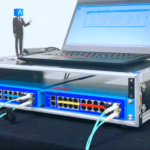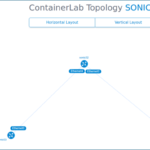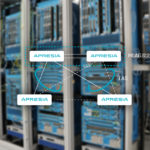「Cumulus LinuxでIP CLOS with EVPN-VXLAN構築」の続編です。 今回は、EVPN-VXLAN構成でVXLANルーティングを設定していきます。
VXLANルーティングについて
Cumulus Linuxでは、2つのアーキテクチャをサポートしています。- 集中型ルーティング
- 1台のGateway装置(もしくは冗長化されたペア装置)が全てのVXLANルーティングを実施
- 最もシンプルな構成
- ルーティングのトラフィックパターンがNorth-Southよりも、East-Westが中心の場合、必ずGatewayを経由するため、DC内で余計なEast-Westトラフィックが増加

- 分散型ルーティング(Asymmetric routing, Symmetric routing)
- Anycast gatewayにより、ホストに最も近いLeafにてVXLANルーティング
- 集中型ルーティングよりもトラフィックフローを最適化可能
- Asymmetric routing, Symmetric routingの双方をサポート

分散型ルーティング
Asymmetric routing
- Ingress VTEPがVNI間のルーティングを実施し、Egress VTEPはブリッジのみを行います。
- 対象のLeaf SWにVLAN/VNIに属するホストがいない場合でも、送信元のVNIと宛先のVNIの双方を各Leafに設定する必要があります。そのため、Leaf SWが保持するべきIPやMACアドレスが増加し、Symmetricよりもスケールが限定されます。
- NW上のVNIを全てのLeaf SWに設定することにより、NW設定の単純化やVMモビリティの確保が可能です。
Symmetric routing
- L3 VNIを経由してルーティングします。
- 各Leaf SWは、ローカルホストのVNIのみを設定するため、Asmmetricよりもスケールメリットがあります。
座学はここまで。それでは実機でSymmetric Routingを確認していきます!
ネットワーク構成
分散型(Symmetric Routing)の構成です。
- VXLANルーティング構成
- Symmetric IRBによりL3 VNI経由でルーティング、各LeafSWにL3 VNI(VNI:104001)を設定
- 各Leaf SWにAnycast Gatewayとして、各SVIに共通のIPアドレスを設定
- VRFを使用したマルチテナント構成
- 外部接続用にEVPN Type5ルート(Prefixルート)を使用し、ボーターLeaf(Exit01)からEVPNでデフォルトルート(0.0.0.0/0)をLeaf01、Leaf02へ広報
- Leaf SWは、Edgecore Networks社のAS5812-54Tを使用
- Spine SWは、Edgecore Networks社のAS5812-54Xを使用
- Exit01(ボーダーLeaf)、Router(外部接続)は、Cumulus VX(仮想OS)を使用
- Cumulus Linux 3.7.3を使用
Config設定
Leaf01
- /etc/network/interfaces
# This file describes the network interfaces available on your system
# and how to activate them. For more information, see interfaces(5).
source /etc/network/interfaces.d/*.intf
# The loopback network interface
auto lo
iface lo inet loopback
address 10.0.0.11/32
# The primary network interface
auto eth0
iface eth0
address 192.168.100.90/24
gateway 192.168.100.1
auto swp1
iface swp1
bridge-vids 100
auto swp49
iface swp49
link-speed 40000
auto swp50
iface swp50
link-speed 40000
auto bridge
iface bridge
bridge-ports swp1 vni-10100 vni-104001
bridge-vids 100 4001
bridge-vlan-aware yes
auto vlan100
iface vlan100
address 172.16.100.1/24 # anycast gateway address
vlan-id 100
vlan-raw-device bridge
vrf vrf1 # vrf1に設定
auto vlan4001 # L3 VNI用VLAN
iface vlan4001
vlan-id 4001
vlan-raw-device bridge
vrf vrf1
auto vni-10100 # L2 VNI設定
iface vni-10100
bridge-access 100
bridge-arp-nd-suppress on
bridge-learning off
mstpctl-bpduguard yes
mstpctl-portbpdufilter yes
vxlan-id 10100
vxlan-local-tunnelip 10.0.0.11
auto vni-104001 # L3 VNI設定
iface vni-104001
bridge-access 4001
bridge-learning off
mstpctl-bpduguard yes
mstpctl-portbpdufilter yes
vxlan-id 104001
vxlan-local-tunnelip 10.0.0.11
auto vrf1 # vrf1設定
iface vrf1
vrf-table auto
- /etc/frr/frr.conf
frr version 4.0+cl3u9
frr defaults datacenter
hostname Leaf01
username cumulus nopassword
!
service integrated-vtysh-config
!
log syslog
!
vrf vrf1
vni 104001 # vrf1にL3 VNI割り当て
exit-vrf
!
interface swp49
ipv6 nd ra-interval 10
no ipv6 nd suppress-ra
!
interface swp50
ipv6 nd ra-interval 10
no ipv6 nd suppress-ra
!
router bgp 65011
bgp router-id 10.0.0.11
bgp bestpath as-path multipath-relax
neighbor FABRIC peer-group
neighbor FABRIC remote-as external
neighbor FABRIC bfd
neighbor FABRIC capability extended-nexthop
neighbor swp49 interface peer-group FABRIC
neighbor swp50 interface peer-group FABRIC
!
address-family ipv4 unicast
network 10.0.0.11/32
exit-address-family
!
address-family l2vpn evpn # EVPN設定
neighbor FABRIC activate
advertise-all-vni
exit-address-family
!
line vty
!
Leaf02
- /etc/network/interfaces
# This file describes the network interfaces available on your system
# and how to activate them. For more information, see interfaces(5).
source /etc/network/interfaces.d/*.intf
# The loopback network interface
auto lo
iface lo inet loopback
address 10.0.0.12/32
# The primary network interface
auto eth0
iface eth0
address 192.168.100.91/24
gateway 192.168.100.1
auto swp1
iface swp1
bridge-vids 100-101
auto swp49
iface swp49
link-speed 40000
auto swp50
iface swp50
link-speed 40000
auto bridge
iface bridge
bridge-ports swp1 vni-10100 vni-10101 vni-104001
bridge-vids 100-101 4001
bridge-vlan-aware yes
auto vlan100
iface vlan100
address 172.16.100.1/24 # anycast gateway address
vlan-id 100
vlan-raw-device bridge
vrf vrf1 # vrf1に設定
auto vlan101
iface vlan101
address 172.16.101.1/24 # anycast gateway address
vlan-id 101
vlan-raw-device bridge
vrf vrf1 # vrf1に設定
auto vlan4001 # L3 VNI用VLAN
iface vlan4001
vlan-id 4001
vlan-raw-device bridge
vrf vrf1
auto vni-10100 # L2 VNI設定
iface vni-10100
bridge-access 100
bridge-arp-nd-suppress on
bridge-learning off
mstpctl-bpduguard yes
mstpctl-portbpdufilter yes
vxlan-id 10100
vxlan-local-tunnelip 10.0.0.12
auto vni-10101 # L2 VNI設定
iface vni-10101
bridge-access 101
bridge-arp-nd-suppress on
bridge-learning off
mstpctl-bpduguard yes
mstpctl-portbpdufilter yes
vxlan-id 10101
vxlan-local-tunnelip 10.0.0.12
auto vni-104001 # L3 VNI設定
iface vni-104001
bridge-access 4001
bridge-learning off
mstpctl-bpduguard yes
mstpctl-portbpdufilter yes
vxlan-id 104001
vxlan-local-tunnelip 10.0.0.12
auto vrf1 # vrf1設定
iface vrf1
vrf-table auto
- /etc/frr/frr.conf
frr version 4.0+cl3u9
frr defaults datacenter
hostname Leaf02
username cumulus nopassword
!
service integrated-vtysh-config
!
log syslog
!
vrf vrf1
vni 104001 # vrf1にL3 VNI割り当て
exit-vrf
!
interface swp49
ipv6 nd ra-interval 10
no ipv6 nd suppress-ra
!
interface swp50
ipv6 nd ra-interval 10
no ipv6 nd suppress-ra
!
router bgp 65012
bgp router-id 10.0.0.12
bgp bestpath as-path multipath-relax
neighbor FABRIC peer-group
neighbor FABRIC remote-as external
neighbor FABRIC bfd
neighbor FABRIC capability extended-nexthop
neighbor swp49 interface peer-group FABRIC
neighbor swp50 interface peer-group FABRIC
!
address-family ipv4 unicast
network 10.0.0.12/32
exit-address-family
!
address-family l2vpn evpn # EVPN設定
neighbor FABRIC activate
advertise-all-vni
exit-address-family
!
line vty
!
Spine01
- /etc/network/interfaces
# This file describes the network interfaces available on your system
# and how to activate them. For more information, see interfaces(5).
source /etc/network/interfaces.d/*.intf
# The loopback network interface
auto lo
iface lo inet loopback
# The primary network interface
address 10.0.0.1/32
# The primary network interface
auto eth0
iface eth0
address 192.168.100.85/24
gateway 192.168.100.1
auto swp48
iface swp48
auto swp49
iface swp49
link-speed 40000
auto swp50
iface swp50
link-speed 40000
- /etc/frr/frr.conf
frr version 4.0+cl3u9
frr defaults datacenter
hostname Spine01
username cumulus nopassword
!
service integrated-vtysh-config
!
log syslog
!
interface swp48
ipv6 nd ra-interval 10
no ipv6 nd suppress-ra
!
interface swp49
ipv6 nd ra-interval 10
no ipv6 nd suppress-ra
!
interface swp50
ipv6 nd ra-interval 10
no ipv6 nd suppress-ra
!
router bgp 65020
bgp router-id 10.0.0.1
bgp bestpath as-path multipath-relax
neighbor FABRIC peer-group
neighbor FABRIC remote-as external
neighbor FABRIC bfd
neighbor FABRIC capability extended-nexthop
neighbor swp48 interface peer-group FABRIC
neighbor swp49 interface peer-group FABRIC
neighbor swp50 interface peer-group FABRIC
!
address-family ipv4 unicast
network 10.0.0.1/32
exit-address-family
!
address-family l2vpn evpn
neighbor FABRIC activate
exit-address-family
!
line vty
!
Exit01
- /etc/network/interfaces
# This file describes the network interfaces available on your system
# and how to activate them. For more information, see interfaces(5).
source /etc/network/interfaces.d/*.intf
# The loopback network interface
auto lo
iface lo inet loopback
# The primary network interface
address 10.0.0.41/32
# The primary network interface
auto eth0
iface eth0
address 192.168.100.94/24
gateway 192.168.100.1
auto swp1
iface swp1
auto swp2
iface swp2
auto swp3
iface swp3
bridge-vids 2001
auto bridge
iface bridge
bridge-ports swp3 vni-104001
bridge-vids 2001 4001
bridge-vlan-aware yes
auto vlan2001 # Routerとの接続I/F
iface vlan2001
address 10.10.10.0/31
vlan-id 2001
vlan-raw-device bridge
vrf vrf1
auto vlan4001 # L3 VNI用VLAN
iface vlan4001
vlan-id 4001
vlan-raw-device bridge
vrf vrf1
auto vni-104001 # L3 VNI設定
iface vni-104001
bridge-access 4001
bridge-learning off
mstpctl-bpduguard yes
mstpctl-portbpdufilter yes
vxlan-id 104001
vxlan-local-tunnelip 10.0.0.41
auto vrf1 # vrf1設定
iface vrf1
vrf-table auto
- /etc/frr/frr.conf
frr version 4.0+cl3u8
frr defaults datacenter
hostname Exit01
username cumulus nopassword
!
service integrated-vtysh-config
!
log syslog
!
vrf vrf1
vni 104001
exit-vrf
!
interface swp1
ipv6 nd ra-interval 10
no ipv6 nd suppress-ra
!
interface swp2
ipv6 nd ra-interval 10
no ipv6 nd suppress-ra
!
router bgp 65041
bgp router-id 10.0.0.41
bgp bestpath as-path multipath-relax
neighbor FABRIC peer-group
neighbor FABRIC remote-as external
neighbor FABRIC bfd
neighbor FABRIC capability extended-nexthop
neighbor swp1 interface peer-group FABRIC
neighbor swp2 interface peer-group FABRIC
!
address-family ipv4 unicast
network 10.0.0.41/32
exit-address-family
!
address-family l2vpn evpn
neighbor FABRIC activate
advertise-all-vni
exit-address-family
!
router bgp 65041 vrf vrf1 # RouterとのBGPピア設定
bgp router-id 10.10.10.1
neighbor 10.10.10.1 remote-as external
!
address-family ipv4 unicast # ホストルートをRouterへ広報
aggregate-address 172.16.100.0/24 summary-only
aggregate-address 172.16.101.0/24 summary-only
exit-address-family
!
address-family l2vpn evpn # EVPN設定
advertise ipv4 unicast route-map DGW # Default Gatewayのみ広報
exit-address-family
!
ip prefix-list DGW seq 5 permit 0.0.0.0/0
!
route-map DGW permit 10
match ip address prefix-list DGW
!
line vty
!
- Spine02は割愛(IPアドレス、ASN、ルーターIDなど個別パラメーターのみの違い)
動作確認
- VM1→VM2へPing: OK(L2通信、VNI-10100)
[root@PCVM-1 ~]# ping 172.16.100.20 -c 1
PING 172.16.100.20 (172.16.100.20) 56(84) bytes of data.
64 bytes from 172.16.100.20: icmp_seq=1 ttl=64 time=1.36 ms
--- 172.16.100.20 ping statistics ---
1 packets transmitted, 1 received, 0% packet loss, time 0ms
rtt min/avg/max/mdev = 1.369/1.369/1.369/0.000 ms
- VM1→VM3へPing: OK(別サブネット通信、Leaf間、L3 VNI-104001)
# ping 172.16.101.10 -c 1
PING 172.16.101.10 (172.16.101.10) 56(84) bytes of data.
64 bytes from 172.16.101.10: icmp_seq=1 ttl=62 time=1.34 ms
--- 172.16.101.10 ping statistics ---
1 packets transmitted, 1 received, 0% packet loss, time 0ms
rtt min/avg/max/mdev = 1.340/1.340/1.340/0.000 ms
- VM2→VM3へPing: OK(別サブネット通信、同一Leaf内)
# ping 172.16.101.10 -c 1
PING 172.16.101.10 (172.16.101.10) 56(84) bytes of data.
64 bytes from 172.16.101.10: icmp_seq=1 ttl=63 time=1.43 ms
--- 172.16.101.10 ping statistics ---
1 packets transmitted, 1 received, 0% packet loss, time 0ms
rtt min/avg/max/mdev = 1.436/1.436/1.436/0.000 ms
- BGP経路情報(Leaf01)
cumulus@Leaf01:~$ net show route vrf vrf1
show ip route vrf vrf1
=======================
Codes: K - kernel route, C - connected, S - static, R - RIP,
O - OSPF, I - IS-IS, B - BGP, E - EIGRP, N - NHRP,
T - Table, v - VNC, V - VNC-Direct, A - Babel, D - SHARP,
F - PBR,
> - selected route, * - FIB route
VRF vrf1:
B>* 0.0.0.0/0 [20/0] via 10.0.0.41, vlan4001 onlink, 07:50:31
K * 0.0.0.0/0 [255/8192] unreachable (ICMP unreachable), 03w6d08h
C>* 172.16.100.0/24 is directly connected, vlan100, 03w6d08h
B>* 172.16.100.20/32 [20/0] via 10.0.0.12, vlan4001 onlink, 07:50:31
B>* 172.16.101.10/32 [20/0] via 10.0.0.12, vlan4001 onlink, 07:50:31
cumulus@Leaf01:~$ net show bgp vrf vrf1
show bgp vrf vrf1 ipv4 unicast
==============================
BGP table version is 24, local router ID is 172.16.100.1
Status codes: s suppressed, d damped, h history, * valid, > best, = multipath,
i internal, r RIB-failure, S Stale, R Removed
Origin codes: i - IGP, e - EGP, ? - incomplete
Network Next Hop Metric LocPrf Weight Path
* 0.0.0.0 10.0.0.41 0 65020 65041 25253 i
*> 10.0.0.41 0 65020 65041 25253 i
* 172.16.100.20/32 10.0.0.12 0 65020 65012 i
*> 10.0.0.12 0 65020 65012 i
* 172.16.101.10/32 10.0.0.12 0 65020 65012 i
*> 10.0.0.12 0 65020 65012 i
ホストルート(172.16.100.20、172.16.101.10)をLeaf02(10.0.0.12)からマルチパスで学習しています。また、デフォルトルート(0.0.0.0/0)をExit01(10.0.0.41)からマルチパスで学習しています。
- EVPNルート情報(Leaf01)
cumulus@Leaf01:~$ net show bgp evpn route type macip
BGP table version is 11, local router ID is 10.0.0.11
Status codes: s suppressed, d damped, h history, * valid, > best, i - internal
Origin codes: i - IGP, e - EGP, ? - incomplete
EVPN type-2 prefix: [2]:[ESI]:[EthTag]:[MAClen]:[MAC]:[IPlen]:[IP]
EVPN type-3 prefix: [3]:[EthTag]:[IPlen]:[OrigIP]
EVPN type-5 prefix: [5]:[ESI]:[EthTag]:[IPlen]:[IP]
Network Next Hop Metric LocPrf Weight Path
Route Distinguisher: 10.0.0.11:5
*> [2]:[0]:[0]:[48]:[08:00:27:81:70:77]
10.0.0.11 32768 i
*> [2]:[0]:[0]:[48]:[08:00:27:81:70:77]:[32]:[172.16.100.10]
10.0.0.11 32768 i
Route Distinguisher: 10.0.0.12:6
* [2]:[0]:[0]:[48]:[08:00:27:99:55:95]
10.0.0.12 0 65020 65012 i
*> [2]:[0]:[0]:[48]:[08:00:27:99:55:95]
10.0.0.12 0 65020 65012 i
* [2]:[0]:[0]:[48]:[08:00:27:99:55:95]:[32]:[172.16.101.10]
10.0.0.12 0 65020 65012 i
*> [2]:[0]:[0]:[48]:[08:00:27:99:55:95]:[32]:[172.16.101.10]
10.0.0.12 0 65020 65012 i
Route Distinguisher: 10.0.0.12:7
* [2]:[0]:[0]:[48]:[08:00:27:8e:a4:c7]
10.0.0.12 0 65020 65012 i
*> [2]:[0]:[0]:[48]:[08:00:27:8e:a4:c7]
10.0.0.12 0 65020 65012 i
* [2]:[0]:[0]:[48]:[08:00:27:8e:a4:c7]:[32]:[172.16.100.20]
10.0.0.12 0 65020 65012 i
*> [2]:[0]:[0]:[48]:[08:00:27:8e:a4:c7]:[32]:[172.16.100.20]
10.0.0.12 0 65020 65012 i
Displayed 6 prefixes (10 paths) (of requested type)
cumulus@Leaf01:~$ net show bgp evpn route type prefix
BGP table version is 53, local router ID is 10.0.0.11
Status codes: s suppressed, d damped, h history, * valid, > best, i - internal
Origin codes: i - IGP, e - EGP, ? - incomplete
EVPN type-2 prefix: [2]:[ESI]:[EthTag]:[MAClen]:[MAC]:[IPlen]:[IP]
EVPN type-3 prefix: [3]:[EthTag]:[IPlen]:[OrigIP]
EVPN type-5 prefix: [5]:[ESI]:[EthTag]:[IPlen]:[IP]
Network Next Hop Metric LocPrf Weight Path
Route Distinguisher: 10.10.10.1:2
* [5]:[0]:[0]:[0]:[0.0.0.0]
10.0.0.41 0 65020 65041 25253 i
*> [5]:[0]:[0]:[0]:[0.0.0.0]
10.0.0.41 0 65020 65041 25253 i
EVPN Type5ルートでPrefix(0.0.0.0/0)を学習していることが分かります。
まとめ
Symmetric routing構成で以下が確認出来ました。- L2 VNI(L2通信)、L3 VNI(L3通信)の混在
- Anycast gateway
- EVPN Type2ルート(ホストルート)、EVPN Type5ルート(Prefix)
「Cumulus LinuxでIP CLOS構築」、「Cumulus LinuxでIP CLOS with EVPN-VXLAN構築」と今回の計3回でお送りしました。 拝見頂いた方、最後までお付き合い有難うございました。
実機で試してみたい方必見!POCキャンペーン開催中!!
ホワイトボックスに興味ある方はこちらへ






